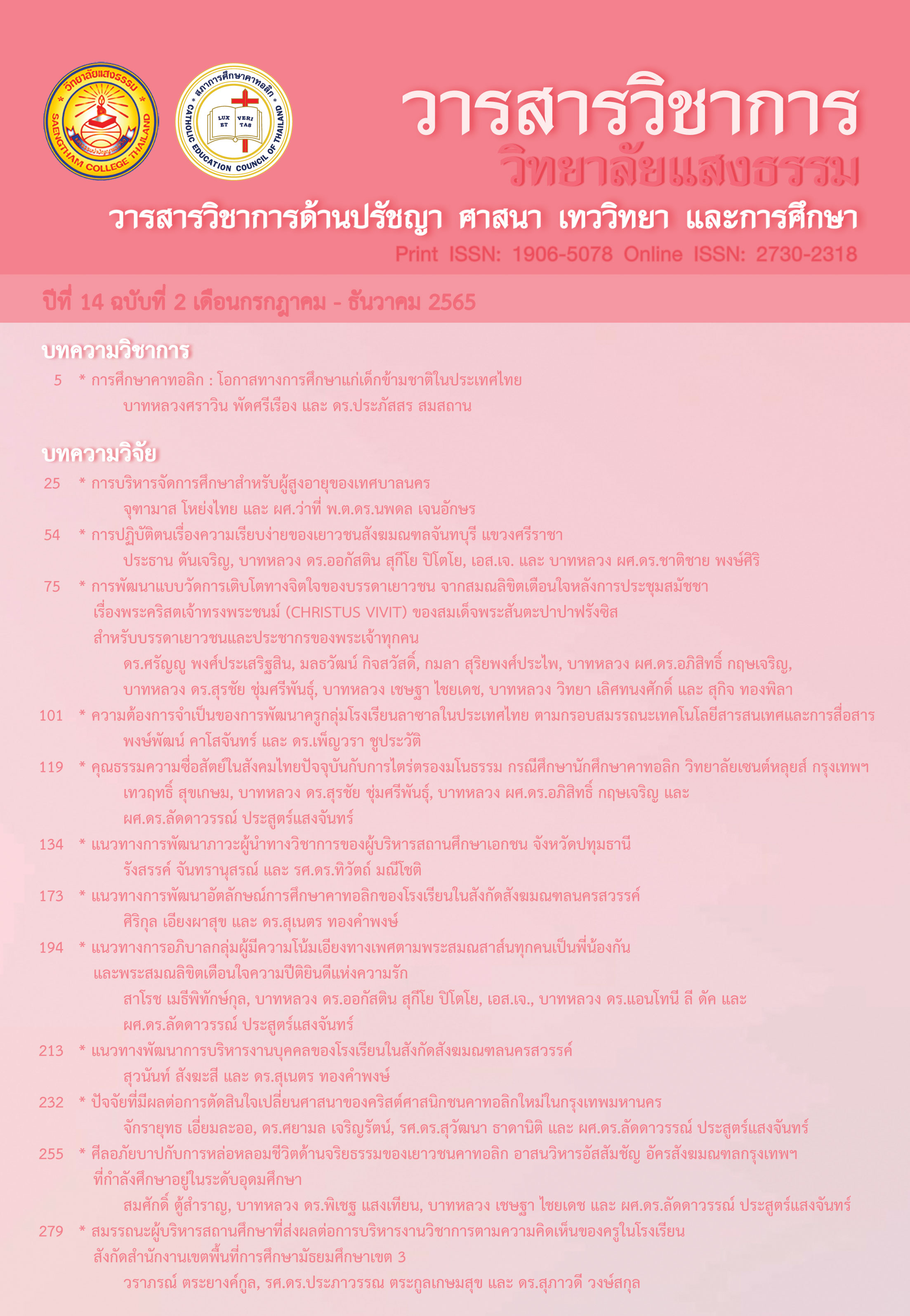The Priority Needs Of Teacher Development Of La Salle Schools In Thailand Based On Ict Competency Framework
Main Article Content
Abstract
The purpose of this research was to 1) study the present state and the desirable of teacher in La Salle schools in Thailand based on the concept of ICT competency framework and 2) study the priority needs of teacher development in La Salle schools in Thailand based on the concept of ICT competency framework. The studies population was La Salle Chotiravi Nakhonsawan School, La Salle Chanthaburi (Mandapitak) School, La Salle School, and La Salle Sangklaburi School, academic year 2020. There were 243 informants consisting of administrators, kindergarten teachers, primary teachers, secondary teachers, and high school teachers. The research instrument used in this study was five levels rating scaled opinionnaire. The data was analyzed by frequency distribution, percentage, arithmetic mean, standard deviation, and Modified Priority Need Index (PNIModified)
The research found that: 1) The present state of teacher in La Salle schools in Thailand based on the concept of ICT competency framework was perform at moderate level. The highest average was curriculum and assessment and the lowest average was application of digital skills. The desirable state of teacher in La Salle schools in Thailand based on the concept of ICT competency framework was perform at high level. The highest average was curriculum and assessment and the lowest average was application of digital skills. 2) The priority needs of teacher development in La Salle schools in Thailand based on the concept of ICT competency framework, sorted from highest to lowest were as follow: the highest aspect of priority need was application of digital skills (PNIModified = 0.325), organization and administration PNIModified = 0.298), pedagogy (PNIModified = 0.286), teacher professional learning (PNIModified = 0.280), understanding ICT in education (PNIModified = 0.274), curriculum and assessment (PNIModified = 0.264), respectively.
Article Details

This work is licensed under a Creative Commons Attribution-NonCommercial-NoDerivatives 4.0 International License.
- The academic and research articles, as well as the content and opinions expressed therein, published in Saengtham College Journal are solely the responsibility of the respective author(s).
- Articles published in Saengtham College Journal are the property of Saengtham College. Reproduction, modification, or dissemination of all or part of the content in any form without written permission from Saengtham College is prohibited.
- Articles published in Saengtham College Journal are protected under the Copyright Act.
References
กระทรวงศึกษาธิการ. (2542). พระราชบัญญัติการศึกษาแห่งชาติ พ.ศ.2542 และที่แก้ไขเพิ่มเติม (ฉบับที่ 2) พ.ศ.2545 และ (ฉบับที่ 3) พ.ศ.2553. https://person.mwit.ac.th/01-Statutes/NationalEducation.pdf
กระทรวงศึกษาธิการ. (2560). แผนการศึกษาแห่งชาติ พ.ศ.2560-2579 (พิมพ์ครั้งที่ 2). พริกหวานกราฟฟิค จำกัด.
กระทรวงศึกษาธิการ. (2562). นโยบายและจุดเน้นของกระทรวงศึกษาธิการ ปีงบประมาณ พ.ศ.2564. https://moe360.blog/2020/01/02/นโยบายและจุดเน้น-ศธ/
กระทรวงศึกษาธิการ. (2564). คำแถลงนโยบายการจัดการศึกษาของนางสาวตรีนุช เทียนทอง รัฐมนตรีว่าการกระทรวงศึกษาธิการ. https://moe360.blog/2021/03/29/29-3-2564/
ถนอมพร (ตันพิพัฒน์) เลาหจรัสแสง. (2561). นวัตกรรมเทคโนโลยีสารสนเทศเพื่อการศึกษาในยุคการเรียนรู้ 4.0. ตองสาม ดีไซน์.
นัทธีรัตน์ พีระพันธ์. (2561). การกำหนดกรอบสมรรถนะและนำเสนอแนวทางการส่งเสริมและพัฒนาสมรรถนะด้านเทคโนโลยีสารสนเทศและการสื่อสารของครูในศตวรรษที่ 21. Veridian E – Journal,Silpakorn University, 11(2), 745-462. https://he02.tci-thaijo.org/index.php/Veridian-E-Journal/article/view/141356/145381
พิมพันธ์ เดชะคุปต์ และ พเยาว์ ยินดีสุข. (2562). ทักษะ 7c ของครู 4.0 (พิมพ์ครั้งที่ 5). โรงพิมพ์แห่งจุฬาลงกรณ์มหาวิทยาลัย.
พิมลพรรณ เพชรสมบัติ. (2561). การวิจัยทางการบริหารการศึกษา. ทริปเพิ้ล เอ็ดดูเคชั่น.
โรงเรียนลาซาล. (2562). รายงานการประเมินตนเองของสถานศึกษา ปีการศึกษา 2562. โรงเรียนลาซาล.
โรงเรียนลาซาลโชติรวีนครสวรรค์. (2562). รายงานการประเมินตนเองของสถานศึกษา ปีการศึกษา 2562. โรงเรียนลาซาลโชติรวีนครสวรรค์.
สืบสกุล นรินทรางกูร ณ อยุธยา. (2563). การบริหารทรัพยากรมนุษย์ทางการศึกษาแนวใหม่. โรงพิมพ์จุฬาลงกรณ์มหาวิทยาลัย.
สุกัญญา แช่มช้อย. (2562). การบริหารสถานศึกษาในยุคดิจิทัล. สำนักพิมพ์จุฬาลงกรณ์มหาวิทยาลัย.
Australian Professional Standards for Teachers. (2011). Australian Professional Standards for Teachers. https://www.aitsl.edu.au/docs/default-source/national-policy-framework/australian-professional-standards-for-teachers. pdf?sfvrsn=5800f33c_64
ISTE Standards for Education Leaders. (2017). ISTE Standards for Education Leaders. https://www.iste.org/standards/for-educators.
Unesco. (2018). UNESCO ICT Competency Framework for Teachers. https://unesdoc.unesco.org/ark:/48223/pf0000265721.


